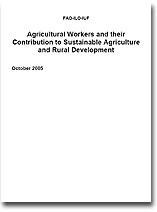 |
FAO-ILO-IUF
Agricultural Workers and their Contribution
to Sustainable Agriculture and Rural Development
Written by: Peter Hurst
in collaboration with Paola Termine and Marilee Karl
Food and Agriculture Organization (FAO)
International Labour Organization (ILO)
International Union of Food, Agricultural, Hotel, Restaurant, Catering, Tobacco and Allied Workers' Associations (IUF)
October 2005
Download PDF 
|
CONTENTS
ACKNOWLEDGEMENTS
FOREWORD
Sustainable agriculture and rural development, food security, and sustainable development
EXECUTIVE SUMMARY
PART I: WAGED AGRICULTURAL WORKERS
WHO ARE THEY?
Full-time permanent workers
Casual, temporary and seasonal workers
Migrant workers
Indigenous rural workers
Lack of standardization of definitions of categories of workers
Wage-dependent small farmers
Developing links between waged agricultural workers and small farmers
Child labourers in agriculture
Hazardous child labour
Child labour and sustainable agriculture and food security
Young workers
The “employment relationship”
WHY FOCUS ON WAGED AGRICULTURAL WORKERS?
Key points
WORKERS AND THEIR TRADE UNIONS IN AGRICULTURE AND THE FOOD INDUSTRY/FOOD CHAIN
National level
International and regional levels
Union organization in transnational corporations in agriculture and along the food chain
Levels of trade union organization in agriculture
PART II: ELEMENTS OF SUSTAINABILITY
THE AGRICULTURAL LABOUR MARKET AND ITS CHANGING NATURE
Trends in waged employment, wages and poverty
Waged employment
Women and waged employment
Casualization
Underemployment/unemployment/hidden unemployment
Sustainable agriculture and labour markets
Wages
Factors affecting wages
Agricultural growth
Food prices and food security
Labour supply
Non-farm employment
Minimum wages
Poverty among waged workers and sustainability
CONDITIONS OF EMPLOYMENT AND WORK
Labour law and international standards
Promoting rights at work
Collective bargaining and the right to organize
What is collective bargaining?
To what extent is collective bargaining an important element in improving working conditions in agriculture?
Which labour standards support the right to bargain collectively?
Contracts of employment
Contract labour and labour contractors
Hours of work
Housing and living conditions
Transport of workers
Occupational health, safety and environment
Labour inspection
The HIV and AIDS epidemic
Households
Farms/production units
Workforce
The FAO Response to HIV/AIDS
Health and sustainable agriculture
The size of the problem
Gender and medical or health care
Medical/health care on plantations
Hygiene provision and welfare services
Social security schemes and benefits
PART III: THE CONTRIBUTIONS OF WAGED AGRICULTURAL WORKERS TO SARD, WORLD FOOD SECURITY AND SUSTAINABLE DEVELOPMENT
Key Points - How trade unions can contribute to sustainable agricultural production, food security and sustainable development
Framework agreements between trade unions and multinational enterprises
Supply chains in agriculture, codes of conduct, fair trade labelling and ethical trading initiatives
Codes of conduct
Agricultural examples – IUF and cut flowers
Ethical Trading Initiative
Fair-Trade
Workers promote Integrated Production and Pest Management
Introducing proper pesticide management practices for greater productivity and sustainable agriculture - occupational health and safety project
Worker-pesticides industry joint training on occupational health, safety and environment
Tripartite cooperation to develop roving safety representatives in agriculture schemes
South Africa
UK
Environmentally sustainable development
Food safety and food security
Food safety
FAO Food Safety and Quality Standards
Food security
The FAO and Food Security
The Sustainable Agriculture and Rural Development Initiative
World Food Summit and follow-up
Elimination of child labour
National level
Sectoral level
HIV/AIDS prevention
Land reform
FAO Study on Waged Agricultural Workers and Land Reform in South Africa
Building links between trade unions and agricultural producers’ organizations
Understanding changing employment patterns in agriculture
Unions and Informalization of Agriculture
Developing alliances between indigenous and tribal peoples and trade unions
Rural and migrant workers
Labour contractors
Water security, pollution and management
Organic agriculture
Literacy campaigns
Savings and credit cooperatives
CONCLUSIONS AND RECOMMENDATIONS
APPENDICES
Abbreviations
ILO International Symposium on Decent Work in Agriculture
REFERENCES

